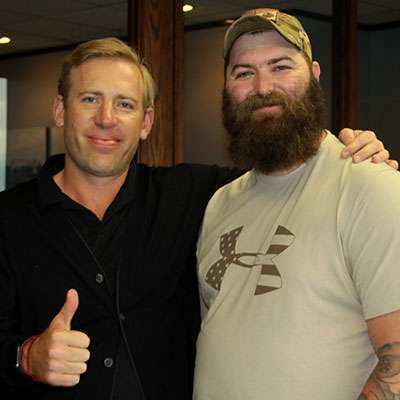

Tim hired us after he was hurt working as a tankerman offshore and his company yanked him around before firing him. He had reached his limit. He knew he had to get help if he wanted to get any justice. Tim is a hard worker, and his company took advantage of his desire to be useful.
He hired us to file a Jones Act lawsuit against the company. He'd suffered multiple knee injuries on the job. He'd had three knee surgeries in less than two years. All because his company didn't follow safety procedures. According to the Jones Act, a federal maritime law that protects offshore and maritime workers, he had a claim for negligence. The company was also obligated to pay his maintenance and cure until doctors determined he had reached maximum medical improvement. They failed to do this as well. He had a good case, which we settled within a year for a confidential amount.
"You're not going through it alone."
After his case ended, he sat down with Brian to talk about his advice for other people in the maritime industry. Tim says:
"My advice is, know that – from what I've learned is – you're not going through it alone. hopefully you've got a good support system – family that can hold you up. And know that it's not your fault. Accidents happen, but when it's someone else's fault and it could have been prevented, to know that to stand on your own two feet and fight back. Do what's right. Don't be afraid, and just know that, if you're looking for anybody to take your hand and take your case, VB is the way to go.
"I'll be honest with you, I'm... above and beyond my expectations.. I didn't know what to expect. But, I'll be honest with you, the outcome was speedy and outstanding and so, I'm glad I took the leap. Because, again, it was... I was really judging where to go from here, and I'm glad that I came and talked to you, and Lena, and Patti. Again, if anyone is going through what I went through – I hope that's not the case, because it was a bad situation, but, it'll get through, it'll get better. And with y'all's help, it most definitely got better.
"It was scary in the aspect of not knowing where the road was going to end and how I was going to provide for my family that I've done so for so long. And you're going to have to buckle down and know that this is your right. It's your right to be represented and to find justice for whatever happened to you and that it's not your fault. And that it does get better but you have to take those certain steps. And it's going to be tough, and it's going to be – uh not really, I can't say, grey areas because y'all made it very easy and answered a lot of my questions. But it's scary in the aspect of where do you go from here and what do you do after this.
"I got hurt and am not able to continue in the tankerman field so I'm having to relearn another trade. And that in itself is scary, but it's whatever it takes to provide for your family and it should be whatever it takes to provide for their family. "
Insurance companies try to make you feel guilty for standing up for your legal rights
Insurance companies spend hundreds of millions of dollars to make you feel guilty about enforcing your constitutional rights, but they won't hesitate to sue you if they feel their rights have been infringed or stepped on in any way. These big companies try to make you feel guilty by making you seem greedy or just wanting money when you file a claim. They put you in a financial bind and make you seem like a bad person for trying to get the compensation you are owed. Tim and Brian talked about how the company put him in a rut, financially and physically. How the company tried to make him feel like a bad person for making the company follow the law. That's all a Jones Act case does – it makes companies follow the law. Tim said the Jones Act settlement he received was "the money that I was hoping to make over the course of years." He went on to say:
"This money is to better my life, and my family's life. To get me out of this rut that the company put me in. All you're trying to be is the person your husband or wife said that you were going to be and provide and they're making you feel like the bad person when you're not. I was able to find my feet and stand up for myself. You've got to find your feet. You've got to stand your ground and know that you're not wrong and what happened to you is not right and it could have been prevented. And it's your constitutional right to fight for that freedom to be yourself, to gain some kind of normalcy. That's what I want – I want normalcy."
Topics: Featured

